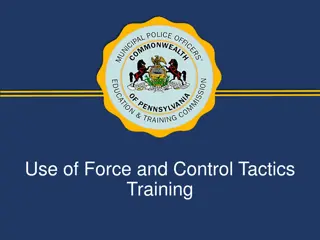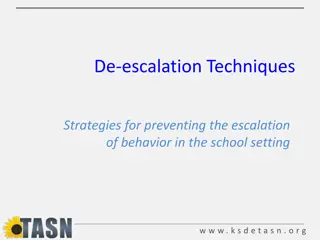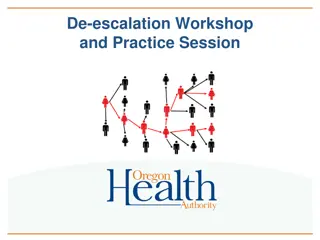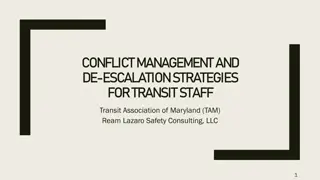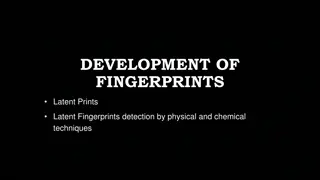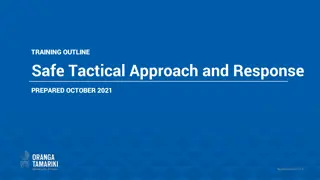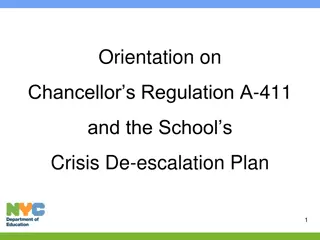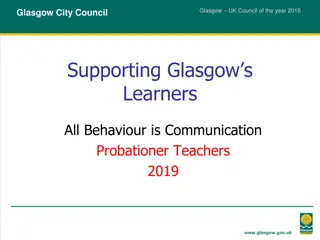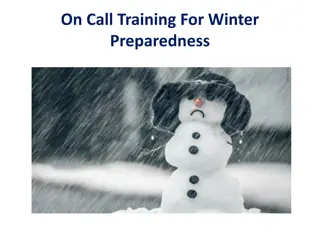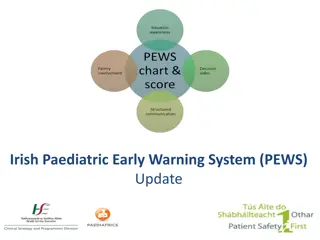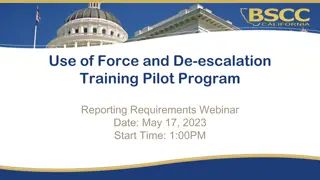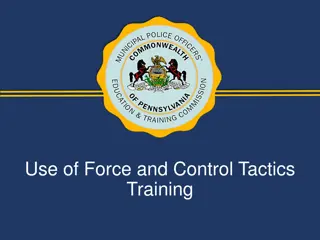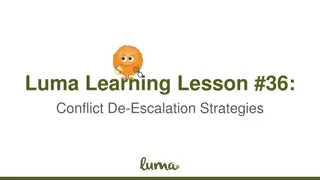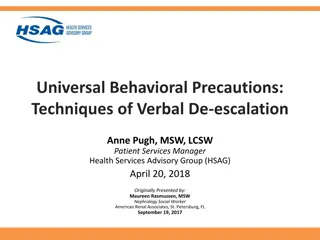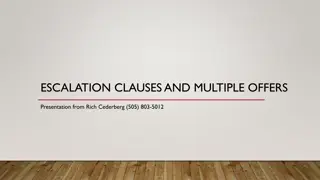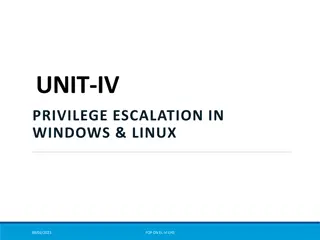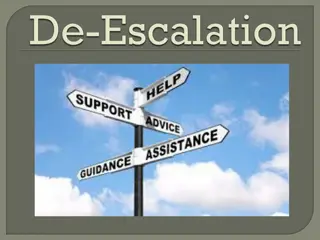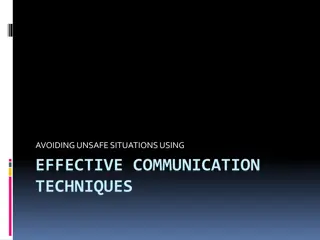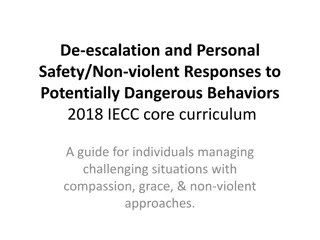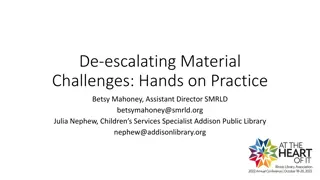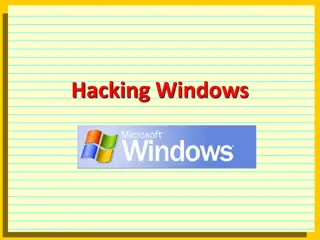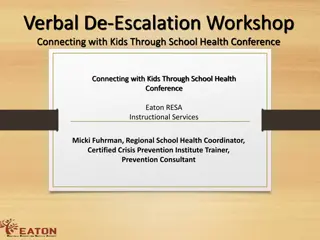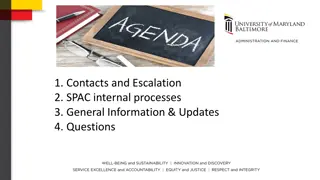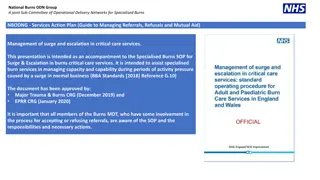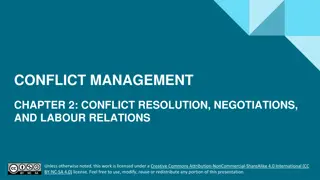Workplace Health and Safety Update - March 2024
The March 2024 update focuses on critical risk statistics, the safety topic of the month which is Aggression and Violence, and highlights the impact of these behaviors on individual and workplace health. It emphasizes the importance of recognizing signs of aggression and violence, de-escalation tech
3 views • 10 slides
Comprehensive Training on Use of Force and Control Tactics
This comprehensive training focuses on legal concepts, civil liability, critical decision-making, de-escalation techniques, and sound control tactics in relation to the use of force and control tactics. Emphasis is placed on the sanctity of human life, proportionality (legally and ethically justifie
0 views • 42 slides
Effective De-escalation Techniques for School Settings
Explore strategies and techniques for preventing behavior escalation in schools based on the work of experts like Dr. Geoff Colvin and Dr. George Sugai. Understand the importance of managing disruptive behaviors, proactive interventions, and stages of escalating behavior. Discover how to become flue
1 views • 52 slides
Scotland's Professional Learning Framework: Co-Regulation and De-escalation
This professional learning framework focuses on co-regulation and de-escalation strategies for Scotland's educators to enhance the well-being and inclusion of Scotland's learners. It includes resources for facilitating group or self-directed learning activities, emphasizing the importance of creatin
1 views • 39 slides
Clinical Escalation: Building Effective Communication in Maternity Units
Exploring the importance of clinical escalation in maternity units, this session outlines the components and practices involved in identifying, communicating, and acting upon clinical concerns. It emphasizes recognizing deviation from normality, effective communication, and taking appropriate action
0 views • 27 slides
De-escalation Workshop and Practice Session Overview
This overview provides insights into a De-escalation Workshop and Practice Session, emphasizing the importance of video and microphone usage, the commitment of the CRRU Training Team, workshop topics, and strategies for building rapid rapport. It also discusses common concerns and pushback faced in
0 views • 25 slides
Conflict Management and De-escalation Strategies for Transit Staff
This presentation by the Transit Association of Maryland (TAM) and Ream Lazaro Safety Consulting provides insights into the increasing assault injuries in transit since 2008, definitions of assault, assault types, contributing factors, basic needs of transit passengers, and passenger traits that may
0 views • 57 slides
Understanding Fingerprint Development Techniques
Exploring the development of latent fingerprints through physical and chemical methods, conditions affecting latent prints, and various fingerprint development techniques like visual examination, powder techniques, and chemical techniques. Techniques such as alternate light sources and powder method
2 views • 22 slides
Safe Tactical Approach and Response Training Outline
This training outline provides an overview of the structure, key topic areas, frameworks, and values of the Safe Tactical Approach and Response (STAR) training. It outlines the learning journey across five days, including theoretical training, defensive tactics, participant roleplays, and assessment
0 views • 10 slides
School Crisis De-escalation Strategies and Plans
Schools in New York City are committed to maintaining safe and orderly environments for effective teaching and learning. Establishing Crisis Intervention Teams and completing Crisis De-escalation Plans are essential. De-escalation strategies involve identifying crises, assessing strengths and weakne
0 views • 31 slides
Effective Strategies for Classroom Management and Positive Behavior Support
Explore concepts on classroom management, behavior communication, and teacher impact on student well-being. Learn about de-escalation techniques, crisis response, and the power of positive feedback in creating a conducive learning environment. Understand the crucial role of teachers in shaping stude
0 views • 68 slides
Understanding Conflict Dynamics and Peace Processes
Explore the distinctions between peacekeeping, peacemaking, and peacebuilding in conflicts. Learn about conflict dynamics and the stages of escalation and de-escalation. Discover how these models guide responses and peace efforts, emphasizing the importance of long-term peacebuilding for sustained r
0 views • 8 slides
Winter Preparedness Training for Strategic Leadership in Escalation Situations
The Winter Preparedness Training focuses on preparing executive leads and on-call managers to provide strategic leadership during extreme periods of escalation. The training covers roles and responsibilities, strengths and weaknesses, escalation processes, teleconference chairing skills, partner col
0 views • 20 slides
Understanding Privilege Escalation and Backdoor Installation in Cybersecurity
Privilege escalation allows unauthorized access to system resources, while backdoors enable persistent access for attackers. The attack scenario involves compromising a website to deploy malicious files, such as Remote Access Trojans, leading to potential system compromise.
0 views • 13 slides
Irish Paediatric Early Warning System (PEWS) Update and Implementation Overview
Explore the latest updates on the Irish Paediatric Early Warning System (PEWS) including learning outcomes, aims, observation charts, key points, escalation guide, and response pathways. Understand the importance of clinical judgment, individualized assessment, and standardized communication for rec
0 views • 15 slides
Intercept X - Early Access Program Overview
Intercept X's Early Access Program offers advanced security solutions to combat active adversaries and advanced malware. The program covers deep learning techniques, false positive mitigations, and credential theft protection. It focuses on protecting against various threats such as credential theft
0 views • 14 slides
Project Management Fees and Escalation Challenges Analysis
In the analysis of project management fees and escalation challenges, key findings include low fee percentages, inconsistent reporting practices, and high escalation rates. Proposals suggest revising fee structures, monitoring design/management fees, and addressing code and practice escalation. Reco
2 views • 12 slides
Data Governance Issue Assessment Process Overview
The data governance issue assessment process formalizes how data issues are resolved by identifying clear steps to resolution, assigning responsibilities, and ensuring proper documentation. Lead stewards, liaisons, committee members, and support personnel play key roles in this process, which includ
1 views • 12 slides
Use of Force and De-escalation Training Pilot Program Reporting
The Use of Force and De-escalation Training Pilot Program aims to enhance law enforcement training methods. Established under the 2022 Budget Act, it requires reporting on participant demographics, training details, incidents, expenditure, and satisfaction metrics. Reports include baseline, annual d
4 views • 15 slides
Effective Ways to Handle Escalation with Your Child
Explore top 10 do's and don'ts when dealing with escalation with your child, emphasizing on maintaining composure, positive communication, and effective de-escalation techniques to handle challenging situations constructively. Learn about common escalation patterns and practical strategies to diffus
0 views • 4 slides
Understanding Use of Force and Control Tactics Training
Explore the legal aspects, civil liability, decision-making practices, de-escalation techniques, and control tactics related to use of force. Emphasizes the sanctity of human life, proportionality in force application, and justifications under the U.S. Constitution and statutes. Examines the criteri
0 views • 42 slides
Conflict De-Escalation: Strategies for Handling Workplace Conflicts
Learn effective conflict de-escalation strategies for handling workplace conflicts. Strategies include removal/walk away, calming yourself, checking voice and body language, being aware of surroundings, expressing empathy and understanding, and reflecting and regrouping for future resolution.
0 views • 7 slides
Effective De-escalation and Distraction Techniques for Children
De-escalation techniques focus on helping children manage overwhelming emotions. Strategies include acknowledging feelings, using distraction, and giving space. Avoid demanding, stay calm, respect personal space, and offer distractions. Knowing what your child likes and dislikes is key to effective
0 views • 6 slides
Techniques of Verbal De-escalation in Healthcare Settings
This presentation provides valuable techniques for recognizing and diffusing potentially volatile situations in healthcare environments to ensure the safety of staff members. It covers topics such as defusing anger, understanding displaced anger, dealing with hostile patients, and effective communic
0 views • 27 slides
Understanding Escalation Clauses in Real Estate
An escalation clause, also known as an escalator, allows a home buyer to increase their offer if a competing offer is higher. This presentation explains the components of an escalation clause, how it works in multiple offer situations, and provides sample language for incorporating it into a real es
0 views • 8 slides
Understanding Privilege Escalation in Windows and Linux Systems
Privilege escalation attacks are malicious tactics used by attackers to gain unauthorized access and elevated privileges in a system. These attacks exploit vulnerabilities in operating systems and web applications, allowing attackers to move deeper into a network to access high-value assets. This co
0 views • 28 slides
Techniques for De-escalating Conflicts and Behavioral Issues
Reduce the intensity of conflicts and potential violence by de-escalating situations through various interventions. Recognize behaviors motivated by external and internal stimuli, peak periods of escalation, and strategies for relationship building. Address oppositional and defiant behaviors, establ
0 views • 13 slides
Effective Communication Techniques for Avoiding Unsafe Situations
Recognize communication danger signs, prevent escalation, and communicate effectively in tense situations. Understand the basics of dynamic communication, sender-receiver dynamics, and instances where tensions arise. Prioritize safety by de-escalating agitated individuals, considering risk factors f
0 views • 31 slides
Effective Strategies for Non-Violent Response to Challenging Behavioral Situations
This guide explores techniques for managing challenging situations with compassion and non-violent approaches, focusing on de-escalation, personal safety, and the importance of maintaining safety in various forms. It covers mental/emotional, verbal, and physical/environmental preparedness to help in
0 views • 33 slides
De-Escalation Strategies in Classroom Management
Learn effective de-escalation strategies to manage classroom behaviors using Love and Logic principles. Explore techniques to prevent explosive behaviors, understand verbal and non-verbal de-escalation methods, and create a proactive plan to address challenging situations. Discover the importance of
0 views • 34 slides
Conflict Resolution Strategies for Managing Natura 2000 Site Conflicts
When faced with conflict at a Natura 2000 site, understanding potential triggers and employing effective communication skills, both verbal and non-verbal, are crucial. This includes managing body language, using appropriate language, active listening, and considering various influences such as attit
0 views • 15 slides
Effective Strategies for Handling Challenging Situations in Libraries
Learn essential de-escalation tips, communication techniques, and responses to common scenarios faced in library settings. Explore tactics like active listening, maintaining calmness, and setting boundaries to navigate issues effectively. Gain insights into promoting diversity and addressing concern
0 views • 30 slides
Windows Security Overview and Best Practices
Windows operating system security overview focusing on preventing unauthorized access, privilege escalation, and password vulnerabilities. Includes countermeasures such as setting proper permissions, implementing strong passwords, and detecting vulnerabilities. Covering topics like remote password g
0 views • 6 slides
Empathic De-escalation for Handling Mental Health Issues in the Workplace
Reduce stigma around mental and behavioral health in the workplace through education. Understand behaviors as forms of communication and learn de-escalation techniques. Manage responses, establish rapport, and use non-judgmental approaches to address escalating situations effectively.
0 views • 9 slides
Verbal De-Escalation Techniques for Connecting with Kids at School Health Conference
This content highlights the importance of verbal de-escalation in connecting with kids through a school health conference, providing insights on crisis development models, handling anxiety, empathic listening, and dealing with defensive behavior. The workshop emphasizes building rapport and understa
0 views • 48 slides
Understanding Fingerprint Development Techniques
Latent fingerprints are hidden impressions left by the friction ridges of the skin which require physical or chemical techniques for visualization. Factors affecting latent prints include surface type, touch manner, weather, humidity, perspiration, and suspect care. Techniques such as visual examina
0 views • 22 slides
SPAC Internal Processes and Contact Information
This information covers SPAC internal processes related to collections, reporting, response time for issues, and escalation procedures. It also provides contact details for various SPAC teams, emphasizing email communication for faster resolutions. Additionally, it outlines the quarterly collections
0 views • 22 slides
Analytical Techniques in Pharmaceutical Analysis
Analytical techniques play a crucial role in determining the identification and concentration of chemical substances in pharmaceutical analysis. Techniques range from simple gravimetric analysis to sophisticated methods using specialized instrumentation. Various techniques like gravimetric, titrimet
0 views • 17 slides
National Burns ODN Group A Joint Sub-Committee Action Plan
This presentation accompanies the Specialised Burns SOP for managing surge and escalation in critical care services. It provides guidance on handling referrals, refusals, and mutual aid to manage capacity during periods of increased activity pressure. The document, approved by Major Trauma & Burns C
0 views • 22 slides
Conflict Management Strategies and Negotiations in the Workplace
This chapter covers conflict resolution, negotiations, and labor relations in the workplace. It includes stages in the conflict process, conflict escalation, approaches to conflict resolution, negotiation techniques, and strategies for managing and preventing conflicts at work. Additionally, it expl
0 views • 16 slides

